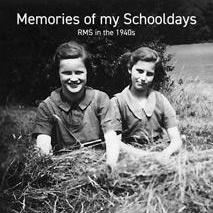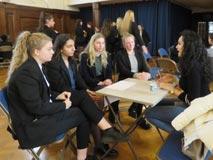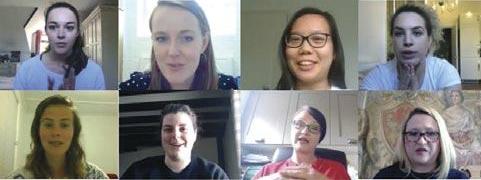
5 minute read
From the archives
from Masonica 2021
D
uring the first lockdown in March 2020, RMS wrote to Old Girls who had attended the school during the 1940s. We invited them to send in their memories of RMS along with photographs and memorabilia. In January 2021 Memories of my Schooldays, RMS in the 1940s was published. It captures beautifully what life was like at RMS before, during and after WW2. Thank you so much to everyone who contributed.
Advertisement
A selection of quotes, photographs and bonus features are displayed across these two pages. To read the book you can find it online at https://tinyurl.com/y6gobcq5. If you would like to have your own copy then please do contact the Development Office.
We will be putting together a book about RMS in the 1950s next. If you were at school at that time and would like to write down your memories of the School please do send them by email to development@rmsforgirls.com or by post to the school.
Joan Mutch and friends
Guides, 1938
There were rumours that the war was about to end. It was Prize Day and we were going to do School Drill in front of the Committee and visitors. The news was coming through that the announcement of the end of the war was due at any minute. The gardeners were placed by each door in the Great Hall and they each had a walkie talkie; if the news came through that the war had ended they were to signal to Miss Fryer up on the platform and she was going to stop the proceedings and tell us.
It wasn’t actually until the next day that it happened, but there was a feeling that it was going to happen at any moment. When the announcement finally came through, we all went mad but we weren’t allowed home. Luckily for me, my mother was allowed to come and visit because she only lived in Watford and that was a great thrill.
Sheila Side (Whittington) 1945, Cumberland The first year of the war was relatively quiet. We had several air-raid drills where we practised going to the shelters which had been built on the edge of the school grounds – well underground. We had to be very careful with our water supply because they were going to need the water if there were ever any fires in London. So we had a line painted on our baths and we were only allowed three inches of water in our baths, no more. All our windows were blacked out with dark curtains so no light could escape, and if there was ever an air raid then the planes wouldn’t be able to see us.
Then, in 1940, we started having air raids in London and although we didn’t experience any over our school, we could hear them because London was only 20 miles away. We could hear the bombs dropping. If we peeped out from underneath the blackout curtains in our dorm (all of our beds were around the edges of the wall of the dorm, and you had a window practically by every bed) we could see the red sky at night and in the morning we could see the black smoke from the bomb damage.
Rosemary Matthews (Prosser) 1945, Cumberland
TO THE LAND ARMY
by M Calcott, Zetland House (with apologies to Longfellow) Under a spreading chestnut tree A group of land-girls stand; These girls are full of energy, They’re out to dig the land. They’ve faces keen and eager, By wind and sunshine tann’d. On days each week (which are not wet) We see them puff and blow; They dig hard for they want to get To victory through the hoe! So, diligently they pull up weeds To let the harvest grow. Their flowing hair in bunches caught Contrasts with jerseys green, Their khaki breeches cause great sport When wearing them they’re seen. And so each day they weed and hoe To make their figures lean. Toiling, rejoicing, labouring, Mud-stained from toe to nose Each morning sees some task begin Each evening sees it close; Something attempted, something done, Has earned a night’s repose!
Each house had 15 children and a staff member from the Weybridge School evacuated to it. The children aged seven to ten had one of the four dormitories, the senior girls were in the other three. We had to keep our garden coats, pixie hoods, gas masks and shoes close to our beds in case the air-raid sirens sounded. The Rickmansworth siren wailed up and down but Croxley Green had an unearthly and quite scary noise.
When the sirens sounded at night, we had to dress over our pyjamas and stand in line until we filed downstairs to be escorted to the trenches. We sat on wooden benches with dim overhead lights until we heard the ‘all clear’ and returned to bed. The sirens sometimes sounded at breakfast time and we went to the trenches with our plates.
Rules were strict and some areas out of bounds as all pupils had to be accounted for in case of an air raid. We carried our gas masks everywhere at this stage. We followed the course of the war with maps and newspapers but until the bombing raids became intense in the autumn of 1940, it all seemed a long way away.
Joan Wingfield (Courtney) 1945, Moira

Sheila Side and friends

Assembly
Girls, 1946
On 3 September 1939, when War was first declared, I was 13 and at home on my summer holidays. I had been at the School for just two years. We had listened to the wireless to hear Neville Chamberlain, the then Prime Minister, announce that we were at war with Germany. I can remember my mother’s reaction, which was one of horror that we should be at war again just over twenty years after the First World War had finished.
After a few days my mother received a letter from the School saying we could go back there early where we would be comparatively safe and away from the towns where bombs might be dropped. I was not overjoyed at having my summer holiday curtailed when my mother decided that, since we lived in London, this would be the right thing to do. But after arriving at school, I quickly changed my mind. Not many parents had sent their girls back and we were about to have the time of our lives.
Jo Hall (Witt) 1943, Cumberland School in Wartime










